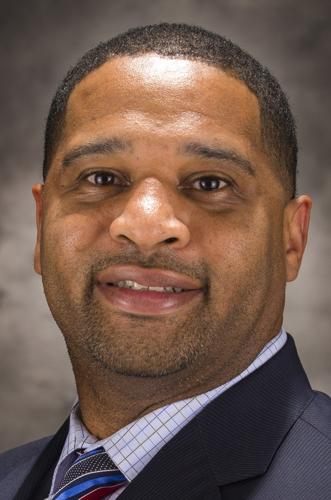The state has shelled out more than $850,000 in legal fees to represent the University of Arizona and former assistant track coach Craig Carter against a civil suit filed by a former student whom Carter admitted assaulting.
Because Carter was a state employee at the time of the alleged incidents, the state is required to pay for his legal representation in the civil suit through an insurance fund provided by the Arizona Department of Administration.
The department is required to provide self-insurance to pay for legal defense in lawsuits brought against the agency itself or current and former employees, for acts that are alleged to have happened within the scope of a person’s employment, said spokeswoman Megan Rose, citing the statute.
The ADOA currently does not have any caps on outside legal fees that the insurance fund will cover, Rose said.
Carter is accused of threatening former UA thrower Baillie Gibson with a box cutter and later dragging her out of a classroom in front of witnesses following a yearslong sexual relationship that she maintains was not consensual.
In an interview with police after he had been read his Miranda rights, Carter admitted to choking and threatening Gibson.
Carter is facing felony charges of aggravated assault with a deadly weapon, stalking and disruption of an educational institution and is scheduled for trial in March at Pima County Superior Court.
In a separate case, he’s accused of violating a restraining order against one of Gibson’s former teammates and is facing charges of aggravated harassment and violation of a restraining order.
Fees have mounted
since 2015 arrest
The state isn’t footing the bill for Carter’s criminal defense in the two cases, which have been dragging out in Pima County Superior Court since his May 2015 arrest.
Six months after Carter’s arrest, Gibson filed a lawsuit against Carter, UA athletic director Greg Byrne, head track and field coach Fred Harvey, the University of Arizona and its Board of Regents and the state, saying the school failed to protect her from repeated rapes, abuse and harassment by Carter.
Between Dec. 31, 2015, through Nov. 30, Tucson attorney John Munger billed $750,453 in legal fees for Carter’s defense, with monthly totals ranging from $2,175 to $68,131, Department of Administration records show.
The state paid for both Byrne’s and Harvey’s legal fees before they were dropped from the lawsuit in November.
Harvey was represented by the state attorney general through the duration of his involvement with the suit, as was Byrne for several years until August, when the athletic director — then at Alabama — hired a private attorney who billed $33,304 through Sept. 30, 2017, according to Department of Administration records.
While the UA and the Arizona Board of Regents were previously represented by the Arizona Attorney General’s Office, they switched routes on Nov. 9 and filed a motion to substitute Tucson firm Rusing, Lopez &Lizardi as counsel for the university.
A provision in state law says that the AG’s Office is authorized to appoint or hire outside counsel when it determines it’s appropriate to do so.
As of Dec. 20, Rusing, Lopez & Lizardi has billed $68,978 in legal fees for their work, ADOA records show.
Billing fees for representation by the AG were minimal, with less than $4,000 in miscellaneous legal expenses incurred between April 2016 and September 2017, ADOA records show.
Legal experts say that while the billing amounts might seem high, it’s impossible to determine if there are any ethical issues without itemized expenses to justify the costs. That information was not immediately available.
Because the case is active, the AG’s Office is ethically limited on what it can say unless the client agency chooses to “waive advice or specific discussions,” Ryan Anderson, director of communications for the AG’s Office, wrote in an email to the Star.
“Generally speaking, the Attorney General’s Office could statutorily appoint outside counsel for a number of possible reasons including the need for subject matter experts, a specific request by the client, resource issues, or differences of opinion in litigation strategy,” Anderson said. “This is not an exhaustive list, but are examples of possible reasons.”
Bruce Skolnik, UA senior associate general counsel who signed the consent for change of counsel on behalf of the Arizona Board of Regents, did not respond to the Star’s request for comment.
Carter’s attorney wants separate trials
On Tuesday, Carter's attorney, Dan Cooper filed a motion to sever charges, saying that the two assault charges should be tried separately from the stalking charge, according to court documents.
“None of the evidence of stalking (text messages, emails, videos or incidents at (Gibson’s) home) is relevant to the assault counts and are thus not admissible,” Cooper wrote in the motion.
The motion says that the assault and stalking offenses are “not alike nor of similar character.”
Police investigators said they uncovered 57 texts and emails Carter had sent to Gibson in the weeks leading up to the assault, four of which contained threatening statements.
While the state is currently required to pay for Carter’s civil defense, that could change if he’s found guilty in the criminal case.
If the state accepted his defense under a reservation of rights, the UA could withdraw its defense post-conviction, because the guilty verdict would prove that Carter acted outside the scope of contract with the UA.
The UA could then attempt to recoup what it paid for Carter’s attorneys.
“When it comes to indemnification and defense … the decision is not up to (the UA,) it’s up to the Attorney General’s Office,” said UA spokesman Chris Sigurdson.
It’s unclear if a reservation of rights is in place, as a representative from the AG’s office wasn’t immediately available for comment.
This isn’t the only lawsuit the UA is locked into with a student: In a federal case filed in October, a current student is suing the school under Title IX violations of sex discrimination, saying that administrators had prior knowledge that former UA football player Orlando Bradford was a danger to women but failed to take action.
Bradford was convicted of two counts of aggravated assault in September after admitting to choking two of his former girlfriends. In November, Bradford was sentenced to five years in prison.
In the lawsuit, the woman cites a UA police report from several months before her own attack during which Bradford’s ex-girlfriend told campus police that he choked and hit her. School administrators banned Bradford from the dorms and moved him off campus into a house with other football players, where both of his admitted attacks later took place.
In the federal case, the UA is still being represented by the AG’s Office, court records show.
The UA could soon be also responsible for paying for legal fees for students accused of misconduct, with Scottsdale Rep. Jay Lawrence introducing a bill last week that would entitle students accused of a crime to be represented by an attorney during disciplinary proceedings — at the school’s expense, if the student can’t afford to pay for a lawyer on his or her own.







